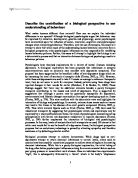Describe the contribution of a biological perspective to our understanding of behaviour
Describe the contribution of a biological perspective to our understanding of behaviour
What makes humans different from animals? How can we explain the individual differences in our species? Although biological psychologists argue that behaviour may be explained by evolution, development, genetics and physiology, social psychologists have commented upon the influence of social, emotional, cognitive and psychological changes when interpreting behaviour. Therefore, with the use of examples, this essay will attempt to show that while much of the understanding human behaviour may stem from a biological perspective; other psychological influences are also responsible for modifying human behaviour patterns. Further, this essay will attempt to highlight that biology is not a deterministic process and that an interaction between biology and psychology results in behaviour patterns.
Psychologists have theorised explanations for a variety of mental illnesses including depression. A biological explanation has been proposed that imbalances in synaptic neurotransmitters such as serotonin may manifest with depressive symptoms. This proposal has been supported by the beneficial effect of anti-depressant drugs which act by increasing the level of serotonin at synaptic clefts (Toates, 2002, p. 251). However, while these antidepressants are said to take 2-5 weeks on average to achieve a therapeutic level, they do not seem to work for everyone. Indeed, patients using these drugs have reported changes in their moods far earlier (Holsboer, F. & Barden, N., 1996). These findings suggest that there may be additional elements besides a purely biological viewpoint contributing to the causes and relief of depression. This is supported by suggestions that although a person may be genetically susceptible for depression, environmental and lifestyle changes may cushion him against developing such an illness (Toates, 2002, p. 276). This view conflicts with the determinist view and highlights the interaction of biology and psychology. In contrast, extreme stress events such as trauma may lead to this illness in the absence of an overt genetic component (Toates, 2002, p. 276). Thus while eminent figures such as Crick (Toates, 2002, p. 228) have used the reductionist viewpoint by suggesting that psychological events and experiences may be explained by a neuronal/biochemical basis, the value of psychological counselling acting synergistically with formal anti-depressant medication to improve depression (Toates, 2002, p. 284) further emphasises the interaction of biological and psychological processes. In this way, levels of analysis from both viewpoints are used. Of interest is that while most would fail to see the benefit of a depressive illness, the biological perspective proposes that an evolutionary advantage is gained by attracting sympathy and therefore assistance or by deflecting potential conflict.







